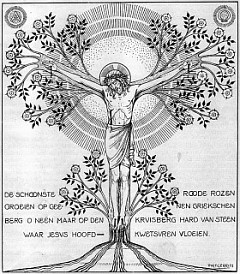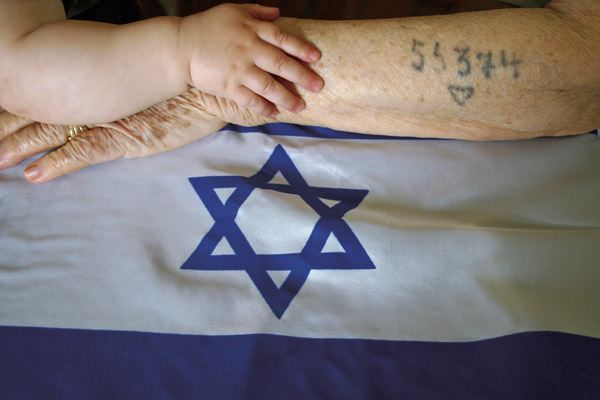The reflection I prepared for Easter Vigil in the Kritische Gemeente IJmond in Heemskerk.
So I managed it again: despite all the business this week brought with itself, I managed to catch its liturgical rhythm. Last Sunday even two services: in the morning Eucharist in
 Leiden and in the evening a beautiful service with
Capella Sancti Adalberti
singing. On Thursday, unfortunately only via the internet, impressive service with foot washing in Washington National Cathedral, after which the altar was stripped . On Friday Good Friday Devotion in Haarlem, with the cross on the stripped altar and the tabernacle open and empty, for it is a day filled with emptiness and a sense of abandonment, a day when we can hear the cry “My God, my God, why have you forsaken me?” – the day whose meaning many KGIJ members experience in a special way during the Good Friday service in the Little White Church on the premises of the Psychiatric Hospital, prepared in collaboration with our choir. And finally we are trying together to make this strange turn from darkness to light.
Leiden and in the evening a beautiful service with
Capella Sancti Adalberti
singing. On Thursday, unfortunately only via the internet, impressive service with foot washing in Washington National Cathedral, after which the altar was stripped . On Friday Good Friday Devotion in Haarlem, with the cross on the stripped altar and the tabernacle open and empty, for it is a day filled with emptiness and a sense of abandonment, a day when we can hear the cry “My God, my God, why have you forsaken me?” – the day whose meaning many KGIJ members experience in a special way during the Good Friday service in the Little White Church on the premises of the Psychiatric Hospital, prepared in collaboration with our choir. And finally we are trying together to make this strange turn from darkness to light.
It struck me again last week that none of these services actually ends. There is no blessing or another liturgical conclusion. It was so already at the evening service in Castricum: we left the church in silence, inaugurating thus the Holy Week. It is not an accident. The point is that we experience that all these days and all these events are part of one great whole. And it is difficult to cope with. For, in truth, we don’t won’t it at all. We would prefer to celebrate Easter having forgotten everything that precedes it. No one wants to suffer, and when we do suffer, we want to forget about it as soon as possible. Also in the KGIJ, when you ask what people expect from our services, the answer is: INSPIRATION. We want to be INSPIRED, that is we want fresh breath in our nostrils, the life-giving breath, life-giving power, which will enable us to move on. We want to have our vision before our eyes, the vision that empowers us to do what is right. But in Dutch Holy Week is called “Still Week” not without a reason. It’s a hard time for the doers, because they are confronted with a very difficult fact, namely that sometimes you can do absolutely nothing. Nothing… Not completely. You can meet one another, you can look for help and support in one another, you can share stories. Difficult stories, dramatic stories, stories full of pain and deep doubt, which sometimes almost seems like despair. And at the same time try to remain open: not lock yourself in the pain, in the sense of abandonment, in loneliness. Not lock yourself up. Perhaps this is the most difficult thing in the Holy Week: on the one hand not to try to escape all what is sorrowful in life, not to look for the “bright side of life” too early, but on the other not to allow yourself to be confined in your sorrow, your powerlessness, your problems. The Holy Week puts into question what I hear most often when I ask at the beginning of a pastoral conversation “How are you?”: “I cannot complain”. Nonsense! Certainly you can. And holding it in yourself or trying to drown it out won’t help you in any way. Drowning out this natural need of complaining, expressing the reasons of your sadness and fear, is the beginning of every depression. You can believe my word on this, because it’s not something I learned from books. I speak about my own experience. But I will say more: you may not only complain, you may also despair. Did I use words I shouldn’t have used? Let me then say this again: YOU MAY ALSO DESPAIR. Or, to remain more in the atmosphere of Good Friday, you may stay and hold vigil by this stripped, devastated altar in your own inner temple. You can look into the abyss of the empty tabernacle, touch the rough wood of the cross, and you can weep and swear… And cry: “My God, my God, why have you forsaken me?”. 40 years ago the KGIJ made a choice. It choose faith that has to be realized by DEEDS. Faith is a DEED, you said then. To believe means to change the world around us, setting out towards the vision. “Be like a salmon swimming against the current”… But here arises the question if you can, not forsaking this beautiful discovery from those times, discover also another side of faith? Are you able to allow the thought that to believe sometimes means simply to stand with empty hands and not be able to do anything? That sometimes you have to deal with the fact that our beautiful vision is falling apart into dust? This is the experience of Good Friday. “We thought”, said the disciples of Jesus somewhere, “that he would liberate Israel”… And maybe the so called “betrayal” of Judas was the final attempt to force Jesus to do just that. Now he has to act, confronted with those who came to arrest him… But he doesn’t act. It is night and the powers of darkness are set loose…
And then something happens – something strange and dangerous. From the depths, from the deepest abyss, from darkness where you can only hear the question: “Watchman, how much longer until morning? When will the night be over?” and the answer “Morning is coming, but it is still night”, in the shackles of our darkest thoughts, locked up in sorrow as though in a tomb, we suddenly see light and hear:
“Thine be the glory, risen, conquering Son;
endless is the victory, thou o’er death hast won;
angels in bright raiment rolled the stone away,
kept the folded grave clothes where thy body lay.”
And then HE himself stands among us: BEATEN YET VICTORIOUS MESSIAH. The Crucified One who conquered death by death. Not by omnipotence but by powerlessness. Not by resistance but by sacrificing himself.
Why is this dangerous? Because we risk “whitewashing” his death on the cross. Worse still, some even come up with the horrible idea that this was “the will of God”. “It had to happen like this”, they say… Yes, in a sense it had. It had to happen like this, because that is how the world is. It had to happen like this, because there are no shortcuts in life and no magic spells. It is so, alas, that we turn this life, this earth, into hell: for each other. We burden each other with crosses, we judge and sentence, and we kill each other… This “it had to happen like this” is not a matter of any fatum or especially of God’s will. God doesn’t have anything to do with this. He remains the God who takes the side of life, against death. It is we… We people did this and continue to do this. And when I hear that some have a problem with the cross, my first reaction is: if the symbol of the cross is abused to praise suffering, I will be first to say: AWAY WITH IT! Suffering alone does not liberate. The cross as such is not a sign of victory. Moreover, it brings with itself the danger that we become used to the sight of human suffering. “It has to be like this, doesn’t it?”… You have no right to complain, because Lord Jesus suffered too. I will say it once more: we have the right to complain. Complain and accuse. We can, and even must, be the voice of those who have been deprived of voice. We have to keep the “recalcitrant memory”, the memory that says: “IT IS NOT HOW IT WAS SUPPOSED TO BE”, IT IS NOT WHAT WE SAW IN THE VERY BEGINNING WITH OUR EYES OF CHILDREN. It is not the world God dreamed and it is why people after God’s heart, who live this original dream in their lives, are crucified in this world. It is not God who crucifies them, but other people. The cross is an
 accusation against all powerful of this world, but also against us when we turn our lives into a struggle for power, which leaves only losers.
accusation against all powerful of this world, but also against us when we turn our lives into a struggle for power, which leaves only losers.
But it is something more… It was a long time ago. I was twelve and went on a trip to Auschwitz with my school. We were in the camp and at one moment stood before the Wall of Death. Thousands of people were killed there. Suddenly I noticed little flags all over that place, white-blue flags with the Star of David. Perhaps you don’t understand this, but it was the first time I saw them in reality, because Poland had severed diplomatic relations with Israel in 1967. Until then I had known the Star of David only as a sign of humiliation and death. I knew that those who wore it during the war were sentenced to death, but there, in Auschwitz, these flags were like first flowers of spring. “Am Israel, hai”. Israel lives. The God of life has not forsaken the work of his hand. In this way the place of death, where you still couldn’t here the birds singing, became for me a place where I could experience the resurrection, and the symbol of death became a symbol of life stronger than any human power. The Star of David becomes the Morning Star. The Cross becomes the tree of life. The tomb is empty, the stone has been removed… Blessed Easter!




